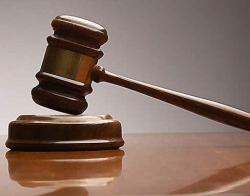Ocean Pro Convicted In Illegal Rockfish Case
July 2, 2010 | 3 min to read

WASHINGTON, July 1 — Following a five-week trial, a fish wholesaler and two of its employees were found guilty with purchasing illegally harvested striped bass, known locally as rockfish, from the Potomac River in Virginia and Maryland from 1995 through 2007, the Justice Department announced today.
Ocean Pro Ltd. d/b/a Profish, one of the largest District of Columbia seafood wholesalers, its vice-president Timothy Lydon of Bethesda, Md., and its fish buyer, Benjamin Clough of Graysonville, Md., were all convicted of a felony conspiracy to violate the Lacey Act. Ocean Pro and Lydon were also convicted of three felony Lacey Act violations, and Clough was convicted of three Lacey Act violations and a felony false statement charge. The Lacey Act is a federal law that prohibits individuals or corporations from transporting, selling or buying fish and wildlife harvested illegally.
Profish and Lydon began buying striped bass from Virginia fishermen fishing on the Potomac River in 1995. Lydon and Profish agreed to buy striped bass that they knew was illegally harvested by seven fishermen between 1995 and 2007. Clough joined Profish in 2001, and he continued to knowingly purchase the illegally harvested striped bass through 2007. In total, the defendants purchased over 270,000 pounds of striped bass illegally harvested from Maryland and Virginia waters, with a fair market retail value over $1.6 million. Evidence was also introduced at trial ta fish wholesaler and two of its employees were found guilty with purchasing illegally harvested striped basshat they altered records regarding their striped bass purchases, and changed records indicating the harvest date on shellfish to make it appear that they were harvested more recently than they were.
Commercial striped bass fishermen are given a quota that they are allowed to catch each year. The fishermen are issued a set number of plastic tags that they are required to affix to every striped bass harvested. In addition, during certain times of the spring, commercial striped bass fishing is prohibited, or, if allowed, a maximum striped bass size limit is imposed that prohibits the harvest of striped bass over that size. The quota restrictions and tagging requirements are designed to prevent the over-harvest of striped bass, and the seasonal closing and size restrictions are designed to protect striped bass while they are spawning and to protect the larger, sexually mature and more productive spawning fish. These restrictions were implemented in the early 1990s following the crash of the striped bass fishery in the 1980s, which resulted in a moratorium on commercial striped bass harvest from 1985 to 1990.
Profish, Lydon, and Clough were willing to buy commercially caught striped bass, which were over the applicable size limit during the spawning season and did not have the required tags affixed. This allowed commercial fishermen to catch and sell more striped bass than they were allowed, and to catch and sell protected spawning striped bass from 1995 through 2007.
In early spring each year, striped bass (Morone saxatilis), known regionally as rockfish, enter the estuary or river where they were born to spawn, and then return to ocean waters to live, migrating along the coastline. Fish spawned from the Chesapeake Bay ecosystem contribute the greatest number of striped bass to the Atlantic coastal fishery, and the commercial fishery for Atlantic coastal striped bass is based primarily on migrations of fish born in the Chesapeake Bay area. Striped bass do not die after spawning. They may live up to 30 years and reach 50 pounds or more. The population of coastal Atlantic striped bass depends heavily upon the capability of older, larger, female striped bass to successfully reproduce.
The charges are a result of the investigation by an interstate task force formed by the U.S. Fish and Wildlife Service, the Maryland Natural Resources Police and the Virginia Marine Police, Special Investigative Unit in 2003. The task force conducted undercover purchases and sales of striped bass in 2003, engaged in covert observation of commercial fishing operations in the Chesapeake Bay and Potomac River area, and conducted detailed analysis of area striped bass catch reporting and commercial business sales records from 2003 through 2007.
To date, including these convictions, the task force has resulted in felony 22 felony convictions: fourteen fishermen from Maryland and Virginia, five individuals who operated seafood wholesale companies, and three seafood wholesale companies in Maryland, Virginia, and the District of Colombia.
These cases were prosecuted by the Justice Department's Environmental Crimes Section and the U.S. Attorney's Office for the District of Maryland.
Source: U.S. Department of Justice
